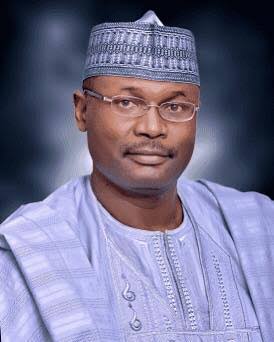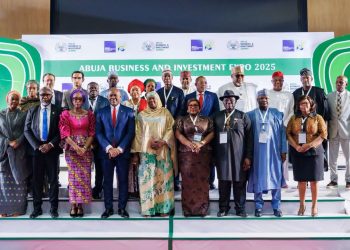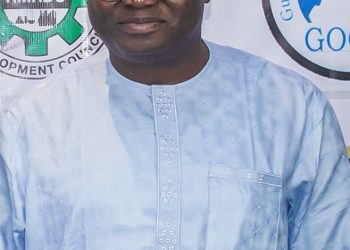
The Inter Party Advisory Council (IPAC) has applauded the contribution of the immediate past Chairman of the Independent National Electoral Commission (INEC), Prof Mahmood Yakubu, to reforming the nation’s electoral system through the massive introduction of technology.
Speaking at a colloquium on ten years of leadership of Prof Mahmood Yakubu as INEC Chairman, National Chairman of IPAC, Alhaji Yusuf Dantalle, said in view of the massive reform by the commission under Prof Yakubu, it was difficult to have multiple voting during elections.
Dantalle said the votes of Nigerians actually counted during general elections despite voter apathy, adding that with the technological innovations introduced by the Mahmood Yakubu leadership, it became difficult for political party to manipulate the system though the use of fake voters cards while also ensuring that only registered voters participated
He said: “In the past, votes were manufactured, results were announced and you have 20 something million, 30 something million. INEC under Professor Mahmood cleaned the voter’s register using technology and now, you cannot have more than one person on the register.
“The name you have here, if you go to Bayelsa, is the same person if you go to Akwa Ibom. So, with that process, the voter’s list was cleaned up. There you have the underage voters that we used to have.
“We have seen fake PVCs that were produced and being thrown in the gutter, we saw it and we brought it. But it was not from INEC and those PVCs could not pass the test of BVAS because we’re fake. That was because of the technology introduced under the leadership of Professor Mahmood.
“So, when the election was conducted in 2023, people complained about voter apathy. But the truth is that even though there was voter apathy, votes were no longer being manufactured by politicians. The votes you saw during the election are the actual votes from Nigerians and nobody could vote more than once”.
Justifying hia claim, Dantalle said: “We saw an election where a sitting governor lost election to the Senate. It happened in Enugu, it happened in Benue, in happened in Kebbi where sitting governors couldn’t win because votes counted. We saw a Peter Obi who did not have councillors anywhere, no local government chairman defeating the incumbent president in Lagos because votes counted”
Dantalle said the technologies that were introduced by Prof. Yakubu Mahmood during his tenure at INEC were home grown technologies, built in-house by staff of the Commission.
He said that in the past, political parties could manipulate the process of submitting names of their candidates for every election, adding that the Yakubu Mahmood era at INEC put an end to that as well as the nefarious activities associated with it.
He said: “Before now, you have political parties coming with trucks of sacks of documents from primary elections to coalition centres. At times you have to pay some officials to ensure that you go in. At times you have to influence officials to change the names of the people that actually won from the field. But Mahamud stopped it using technology.”
The IPAC Chairman said as the Chief Electoral Umpire, Prof Yakubu “made political parties to own the system of uploading the names of their candidates. Initially, the parties were not doing that. INEC also realised that they were still replacing the names of prospective candidates who are winners of primary elections.
“What INEC did was to ensure that they have a backup of the names of those that actually contested for the primary and all the results that emerged from the primary. If you try to upload names of those that did not win the primary, the system will automatically reject it. What this has done is that it has tremendously reduced pre-election litigations from primary elections.
“There is no innovation that Mahmoud Yakubu introduced into the system without the imput and consensus of stakeholders such as political parties and civil society organisations. So, all the innovations and technological input or otherwise that were introduced have the acceptability of the major stakeholders”.
He explained that in the implementation of the technological innovations, political parties will be given the liberty to introduce whoever they want from their parties to be trained by INEC so that they will be conversant with the use of such technologies.
He said “Political parties were made to own a system of uploading their candidates using technology under the supervision of INEC. Political parties were made to own a system of uploading their own party agents who will observe elections.
“In the past, every party would just produce a list of name. But here, you have a situation where political parties will bring in the names, the particulars of people that are identifiable and not just ghosts. This was done during the leadership of Professor Mahmood.
The mode of consultation under Mahmood was something else. Every three months, we have consultation with political parties, with civil society organisations, with members of the media, with security agencies and when there is necessity. But that doesn’t mean we are where we need to be. But we are not where we used to be.
“But we are challenging whoever is coming after him to build on what he has done because he has done tremendously well. I am saying this on behalf of political parties”.
On registration of political parties, he said the process which is ongoing is delayed because of the stringent measures introduced by the commission which has made it practically impossible for one person to register a political party.
He said: “In the past, you see a political party where one man is the chairman, his wife is the women leader, his son is the national secretary. But today it’s not like that with the registration ongoing. That is why it’s been difficult.
“It is not that INEC refused to register, but meeting the criteria for registration is the difficulty that you have seen. One of the conditions attached to membership of the prospective political parties is ownership of PVC because the data on the PVC is with INEC.
Delivering his lecture titled “INEC under Prof. Mahmood Yakubu”, Keynote Speaker, Prof Emmanuel Aiyede of the University of Ibadan, applauded the former INEC chairman for introducing technology into the nation’s electoral system.
Prof Aiyede said, however, that technology alone is not enough to ensure a credible election and called for a forward looking approach to handling issues of electoral reforms in the country and not merely one that was achieved during in the last ten years.
He said “the true measure of leadership lies not merely in what one accomplishes, but in the structures one leaves behind to sustain progress. Nigeria’s electoral journey, under his stewardship, has been redefined by a quiet but profound technological revolution.
“From the Bimodal Voter Accreditation System (BVAS) and the INEC Results Viewing Portal (IReV) to the digitalisation of candidate nomination, observer accreditation, and voter registration, technology has become the new grammar of electoral credibility. These tools did not emerge by accident; they were the product of foresight, an understanding that democracy in the twenty-first century must rest on verifiable data, not just declarations.
“However, Yakubu’s real legacy lies not in the machines themselves, but in the institutional mindset that now governs their use. He helped shift INEC from seeing technology as a novelty to treating it as infrastructure, as integral to electoral governance as polling booths and ballot boxes.
“The Commission under his watch learned that technology cannot substitute for integrity, but it can amplify it. It cannot eliminate manipulation, but it can make manipulation traceable, accountable and therefore riskier.
“The next frontier for Nigeria’s democratic consolidation lies in deepening and sustaining this institutional culture. As INEC enters a post-Yakubu era, the challenge will be twofold: to preserve the gains of digital transparency while addressing the operational bottlenecks that accompany them.
“Technology must now evolve from tools of election-day administration to instruments of long-term democratic planning, powering data-driven decisions on constituency delimitation, voter education, logistics, and security coordination.
“Equally, the Commission must continue to professionalise its human capital. Machines can authenticate fingerprints, but only human integrity can authenticate elections. The future will demand a new generation of electoral managers fluent in both law and technology. INEC require individuals who can navigate not only codes and algorithms but also the ethical dilemmas of power, persuasion, and public trust.
“For Nigeria, the path ahead is both challenging and promising. The 2022 Electoral Act has created the legal foundation for a more transparent system. What remains is to ensure its faithful implementation across every state, every polling unit, and every election cycle.
“As network infrastructure improves and as digital literacy expands, the full promise of BVAS and IReV systems will begin to unfold, reducing human error and strengthening confidence in the ballot as the ultimate arbiter of legitimacy.
“But democracy cannot rely on technology alone. The future of Nigeria’s elections will depend on institutional cooperation and civic responsibility. Political parties must internalise democratic norms, the judiciary must uphold electoral justice with courage, security agencies must act with impartiality, and citizens must continue to defend the sanctity of the vote.
“INEC, for its part, must remain a custodian that is firm, fair and forward-looking, committed to serving not governments or parties, but the Nigerian people.
In this sense, Professor Mahmood Yakubu’s decade at the helm was not merely a period of reform but a rehearsal for the future.
“His leadership has shown that credible elections are not miracles of circumstance but outcomes of discipline, discipline in law, in process, and in principle. He leaves behind an institution that is stronger”
Executive Director, Centre for Transparency Advocacy, Faith Nwadishi, said the event was organised to reflect on a defining era in Nigeria’s democratic journey, adding that the colloquium is not merely to celebrate tenure, but to reflect, review, and recommend — to identify what has worked, where challenges remain, and how we can collectively strengthen the electoral process going forward.
She said Prof Yakubu “institutionalised continuous voter registration, expanded stakeholder consultations, and strengthened the Commission’s internal systems. Importantly, he opened INEC’s doors wider to civil society, media, and other groups, and prioritised transparency in election management.
“He was very gender sensitive as he created the first crech in the INEC headquarters allowing nursing mothers to take care of their babies while at work.
“Yet, as we reflect, we must also acknowledge the persistent challenges — the growing security threats that have made elections in some parts of Nigeria extremely difficult; vote buying and voter intimidation that undermine the will of the people; and voter apathy, which threatens the very foundation of democracy.
“These challenges remind us that innovation alone is not enough — our collective commitment, institutional reform, and political will must match our technological advancements”.





























